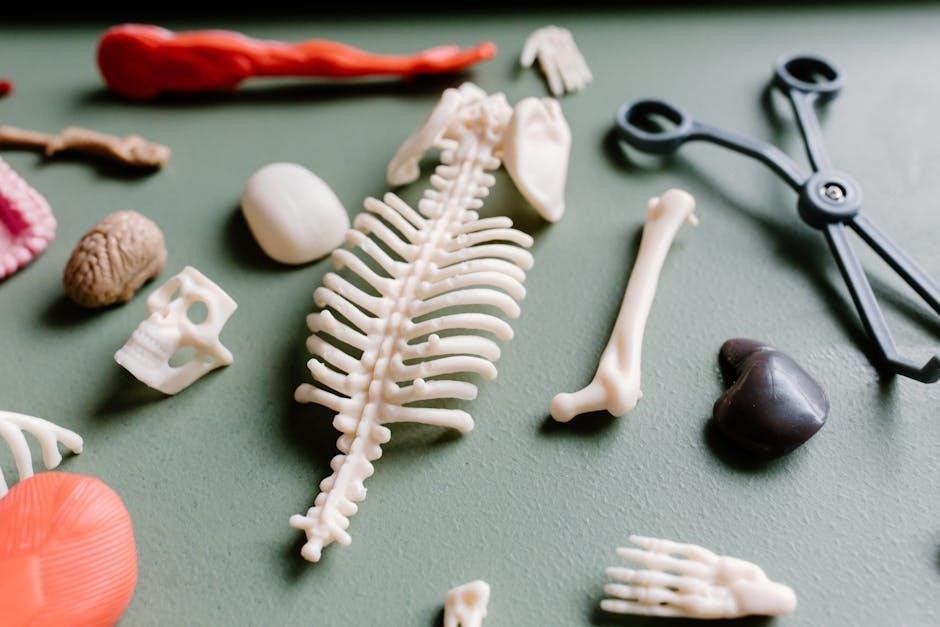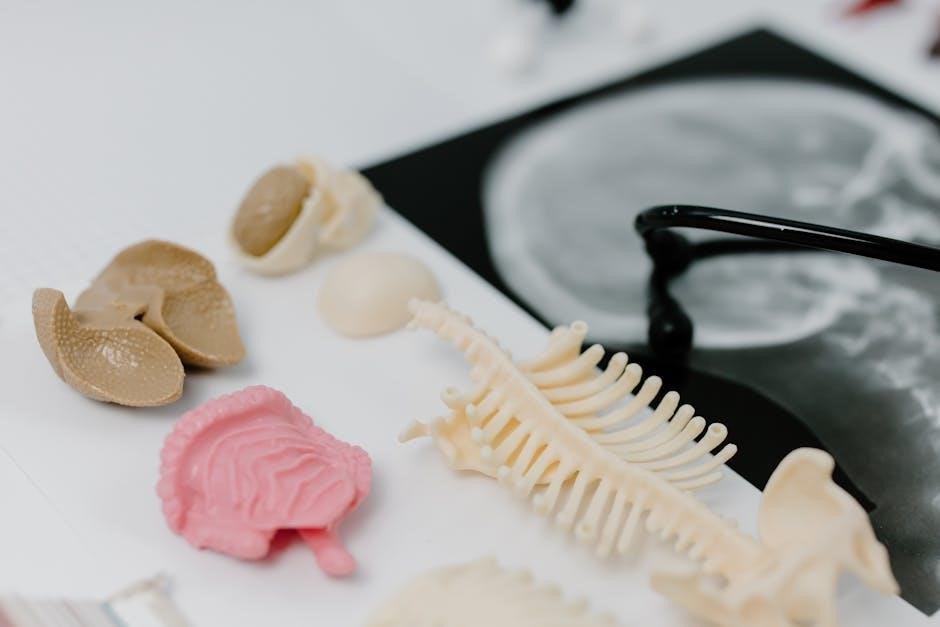Nursing study guides are structured resources designed to help students master foundational concepts, apply knowledge, and prepare for exams and clinical practice effectively.
1.1 What Are Nursing Study Guides?
Nursing study guides are comprehensive resources designed to help students and professionals master key concepts, theories, and practical skills in nursing. They typically include detailed explanations, practice questions, and real-world examples to enhance learning and retention. These guides often cover essential topics such as anatomy, pharmacology, and patient assessment, making them invaluable tools for both academic and clinical success in the nursing field.
1.2 Importance of Nursing Study Guides for Students
Nursing study guides are essential tools for students, providing structured learning materials that simplify complex concepts. They offer practical examples, practice questions, and flashcards to enhance understanding and retention. These guides help students prepare for exams, develop critical thinking, and apply knowledge in real-world clinical scenarios, fostering confidence and competence in their nursing education and future careers.
Key Components of Nursing Study Guides
Nursing study guides include essential topics like anatomy, pharmacology, and assessment skills, providing structured resources to enhance learning and clinical application for students.
2.1 Anatomy and Physiology Basics
Nursing study guides emphasize anatomy and physiology as foundational knowledge, detailing body systems, functions, and common conditions. These sections often include diagrams and real-world examples to aid understanding, helping students connect theoretical concepts to practical patient care scenarios. This knowledge is crucial for accurate assessments, effective treatments, and identifying deviations from normal physiological states.
2.2 Pharmacology Fundamentals
Nursing study guides provide detailed overviews of pharmacology, covering drug classifications, mechanisms of action, dosages, and potential side effects. Key concepts such as medication administration routes, contraindications, and therapeutic effects are emphasized. These sections often include practice exercises and case studies to enhance understanding, ensuring students can apply pharmacological principles safely and effectively in clinical settings.
2.3 Nursing Assessment Skills
Nursing study guides emphasize the importance of comprehensive patient assessments, including physical exams, vital sign monitoring, and health history reviews. These guides provide frameworks for systematic evaluation, such as the head-to-toe assessment, and highlight red flags for common conditions. They also focus on documenting findings accurately and using critical thinking to prioritize care, ensuring students develop the skills needed for effective patient evaluation and decision-making in clinical settings.
Effective Study Strategies
Effective study strategies for nursing involve active learning, spaced repetition, and practical application. Using flashcards, group discussions, and real-world case studies enhances retention and critical thinking, fostering a deeper understanding of nursing concepts and their clinical applications.
3.1 Active Learning Techniques
Active learning techniques engage nursing students through interactive methods like problem-solving exercises, group discussions, and real-world case studies. These approaches encourage critical thinking and practical application, helping students connect theoretical knowledge to clinical scenarios. By participating in simulations and role-playing, learners develop decision-making skills and confidence, enhancing their readiness for professional practice and fostering a deeper understanding of patient care.
3.2 Using Flashcards for Memorization
Flashcards are a valuable tool for nursing students to memorize key terms, medications, and procedures. By breaking down complex information into concise, digestible content, flashcards simplify studying and reinforce retention. Students can use physical cards or digital apps like Quizlet to create and review sets, making memorization efficient and accessible. This method is particularly effective for preparing for exams and mastering pharmacological facts.
NCLEX Practice Questions
NCLEX practice questions simulate real exam scenarios, helping nursing students assess readiness, identify weaknesses, and refine critical thinking and prioritization skills essential for licensure success.
4.1 Understanding Question Formats
NCLEX questions include multiple-choice, select-all-that-apply, and hotspots. Each format tests different skills, such as critical thinking and prioritization. Understanding these formats helps students approach questions systematically.
Practice with various question types improves familiarity and reduces exam anxiety. Analyzing rationales enhances comprehension of correct and incorrect answers, refining decision-making abilities for future clinical scenarios.
4.2 Critical Thinking and Prioritization
Critical thinking involves analyzing patient scenarios, identifying key issues, and evaluating options. Prioritization ensures nurses address the most urgent needs first. Both skills are vital for safe, effective care. Practice questions often simulate real-world situations, requiring students to apply knowledge and make sound decisions. Refining these abilities through study guides and practical exercises enhances confidence and competence in clinical settings.
Time Management Tips
Effective time management is crucial for nursing students. Create balanced schedules, prioritize tasks, and minimize distractions to enhance productivity and reduce stress during studies and clinical rotations.
5.1 Creating a Study Schedule
Creating a study schedule helps nursing students organize their learning effectively. Set realistic goals, allocate specific time blocks for each subject, and include regular breaks. Prioritize tasks based on urgency and complexity, ensuring a balance between theory and clinical practice. Use calendars or planners to track progress and stay accountable. Consistency and adaptability are key to maintaining an effective study routine.
5.2 Balancing Theory and Clinical Practice
Balancing theory and clinical practice is crucial for nursing students. Theory provides foundational knowledge, while clinical practice hones practical skills. Integrate both by applying concepts learned in class to real-world scenarios. Use tools like care plans and case studies to bridge the gap. Allocate time for both studying and hands-on training to ensure comprehensive understanding and skill development.
How to Integrate Theory into Practice
Integrate theory into practice by applying classroom concepts to real-world scenarios, using case studies, and engaging in hands-on clinical training to enhance practical skills and decision-making.
6.1 Applying Knowledge in Real-World Scenarios
Applying knowledge in real-world scenarios involves using theoretical concepts to address patient care challenges. Nurses analyze symptoms, prioritize interventions, and evaluate outcomes, bridging classroom learning with practical experience. This approach fosters critical thinking, adaptability, and effective decision-making, essential for delivering high-quality care. Real-world application enhances problem-solving skills, ensuring nurses can respond confidently to diverse clinical situations.
6.2 Case Studies and Scenario-Based Learning
Case studies and scenario-based learning provide realistic examples of patient care situations, enabling students to analyze symptoms, diagnose conditions, and develop treatment plans. These tools mimic clinical environments, allowing learners to practice decision-making and critical thinking. By engaging with diverse scenarios, nursing students gain hands-on experience, preparing them for the challenges of real-world healthcare settings and improving their ability to apply theoretical knowledge effectively.

Common Challenges in Nursing Studies
Nursing students often face challenges like managing heavy workloads, understanding complex medical concepts, and balancing academic demands with clinical responsibilities, requiring strong organizational and time-management skills.
7.1 Overcoming Information Overload
Nursing students often struggle with information overload due to the vast amount of material. To manage this, focus on key concepts, use active learning techniques, and organize notes. Prioritize subjects based on relevance and upcoming exams. Utilize flashcards for memorization and break study sessions into manageable chunks to enhance retention and reduce stress effectively.
7.2 Building Confidence in Decision-Making
Building confidence in decision-making requires practice and exposure to real-world scenarios. Engage in active learning, such as case studies and simulation exercises, to refine critical thinking. Regularly review NCLEX practice questions to improve prioritization skills. Seek feedback from instructors and peers to identify areas for improvement. Over time, these strategies enhance your ability to make sound, confident decisions in clinical settings.

Utilizing Online Resources
Online resources provide access to educational websites, advanced search techniques, and forums, aiding nursing students in efficient studying and research.
8.1 Recommended Websites and Forums
Popular websites like Quizlet and specialized forums offer valuable resources for nursing students, providing flashcards, practice questions, and discussion boards. These platforms facilitate interactive learning and peer support, helping students grasp complex concepts efficiently; Utilizing advanced search techniques on Google, such as site-specific searches, enables quick access to reliable academic materials and professional guidance tailored to nursing education.
8.2 Advanced Search Techniques for Research
Mastering advanced search techniques enhances research efficiency. Using specific keywords, Boolean operators, and filters helps refine results. Google’s site-specific searches and quote searches for exact phrases are particularly useful. Additionally, employing tools like database filters and advanced search options on academic platforms streamlines the process, ensuring access to relevant, high-quality resources for nursing studies and professional development.
Role of Technology in Nursing Education
Technology enhances nursing education through interactive tools, simulation software, and digital resources, fostering engagement and practical skill development for future healthcare professionals.
9.1 Nursing Apps and Digital Tools
Nursing apps and digital tools, such as Quizlet and simulation software, provide interactive learning experiences, enabling students to master concepts like pharmacology and anatomy through flashcards and real-time simulations, enhancing both theoretical knowledge and practical skills for future nursing professionals.
9.2 Simulation Software for Clinical Training
Simulation software provides interactive, real-world scenarios for nursing students to practice clinical skills, assess patients, and make decisions in a risk-free environment. These tools bridge the gap between theory and practice, allowing students to apply knowledge effectively. They enhance critical thinking, confidence, and preparedness for actual clinical rotations, making them invaluable for modern nursing education and training.

Preparing for Clinical Rotations
Preparing for clinical rotations involves developing essential skills, understanding clinical expectations, and building confidence. It ensures students are ready to apply knowledge in real-world healthcare settings effectively.
10.1 Essential Skills for Clinical Settings
Essential skills for clinical settings include strong communication, patient assessment, and critical thinking. Students must also master technical skills like medication administration and documentation. These skills ensure safe, effective patient care and professional competence. Proper preparation through study guides and hands-on practice helps build confidence and readiness for real-world clinical challenges.
10.2 Documentation and Reporting Best Practices
Accurate and clear documentation is crucial for effective patient care. Nurses should record observations, interventions, and outcomes thoroughly; Using standardized formats and avoiding abbreviations ensures clarity. Timeliness and completeness are key to maintaining continuity of care. Regular reviews and updates help prevent errors. Proper documentation also supports legal compliance and communication among healthcare teams, ensuring patient safety and accountability in clinical settings.
Professional Development
Professional development in nursing involves continuous learning, skill enhancement, and ethical practice to advance careers and improve patient care. It ensures adaptability to evolving healthcare demands.
11.1 Understanding Professional Competence
Understanding professional competence in nursing involves mastering clinical skills, ethical decision-making, and effective communication. It ensures nurses deliver safe, patient-centered care and adapt to diverse healthcare settings. Developing competence fosters confidence and accountability, enabling nurses to meet high professional standards and contribute positively to healthcare teams. Regular training and self-assessment are key to maintaining and enhancing competence.
11.2 Building a Nursing Career
Building a nursing career requires strategic planning, continuous learning, and networking. Nurses should identify specialties, pursue certifications, and seek mentorship to advance. Staying updated on industry trends and engaging in professional organizations can enhance opportunities. A strong resume and interview skills are crucial for securing desired roles. Lifelong commitment to professional development ensures growth and fulfillment in this dynamic field.

Final Tips for Success
Stay organized, use active learning techniques, and practice consistently. Prioritize NCLEX prep, seek support from peers, and maintain a growth mindset to excel in nursing studies.
12.1 Staying Organized and Focused
Stay organized by creating a structured study schedule and setting clear, achievable goals. Use planners, digital tools, or apps to track progress and balance academic tasks. Minimize distractions by dedicating specific times for studying and breaks. Regularly review notes and practice questions to maintain focus and retention. Consistency and self-discipline are key to staying on track and excelling in nursing studies.
12.2 Seeking Support from Peers and Mentors
Building a strong support network with peers and mentors is vital for success in nursing studies. Collaborate with classmates to discuss challenging topics and share resources. Mentors can provide career advice and help navigate academic challenges. Engaging in study groups fosters collaboration and mutual understanding. Don’t hesitate to seek guidance from experienced professionals to enhance your learning journey and build confidence in your abilities.
Nursing study guides are essential tools for student success, helping integrate knowledge and apply it practically. They enhance performance, boost confidence, and prepare learners for exams like the NCLEX. By staying organized, focused, and supported, nursing students can thrive in their education and career. These guides are invaluable resources for fostering competence and ensuring a strong foundation in the nursing profession.


